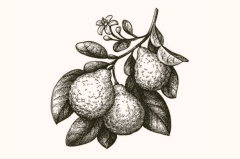Discover the therapeutic benefits of Bergamont, from heart health to stress relief, plus its key active compounds and cautions.
Citrus bergamont, the bergamot orange, is in the citrus family, probably originally bred as a hybrid of a lemon and a bitter orange tree. It blossoms in winter and is very fragrant. Bergamont has also been classified as Bergamont sub species bergamia.
The fruit is edible, although sour and very bitter. The essence extracted from the aromatic skin of this fruit provides the distinctive flavour of Earl Grey tea. This citrus bergamot is unrelated to the herbs known as bergamot — the Monarda herbs in the mint family — but it has a similar aroma.
Citrus bergamot is grown in southern Italy, France and southern Turkey, but is not used for its juice — as it is in Mauritius. In these areas, it’s grown mainly for its oil, which is used as a fragrance and for its medicinal properties.
Active ingredients
Many parts of bergamot have been shown to be clinically effective, including the juice, oil and peel. The active ingredients in bergamot juice include neoeriocitrin, naringenin and hesperetin. Early research on melitidin and brutieridin, which exists only in citrus bergamot, shows promise for cholesterol-reducing activities, albeit a naturally sourced version. The oil contains furocoumarins such as bergamottin.
Therapeutic uses
Cardiovascular:
A highly concentrated extract of bergamot juice has shown potential to be a natural statin. It may lower cholesterol and triglycerides and reduces atherosclerosis. Several clinical trials on patients diagnosed with moderate atherosclerosis have shown positive results with significant reductions in plasma lipids and improved lipoprotein profiles. Some studies also showed a reduction in bodyweight, waist circumference and BMI.
Liver:
One study of 107 patients with non-alcoholic fatty liver disease (NAFLD) showed that bergamot extract significantly improved all measured biochemical markers of this disease in 120 days — without any side-effects.
Metabolic syndrome:
Randomised controlled trials showed that 500mg/day of hesperidin (from bergamot) for three weeks showed an improvement in vascular integrity, while reducing lipotoxicity and insulin resistance in patients diagnosed with metabolic syndrome. Bergamot extracts were also shown to be effective in improving endothelial function and weight management in obese children and adolescents from 10 to 18 years of age.
Anti-microbial:
In vitro studies on bergamot juice have shown effectiveness against the pervasive organism Helicobacter pylori, including antibiotic-resistant H. pylori — thought to be caused by bergamot juice damaging the microbial lipid mem





